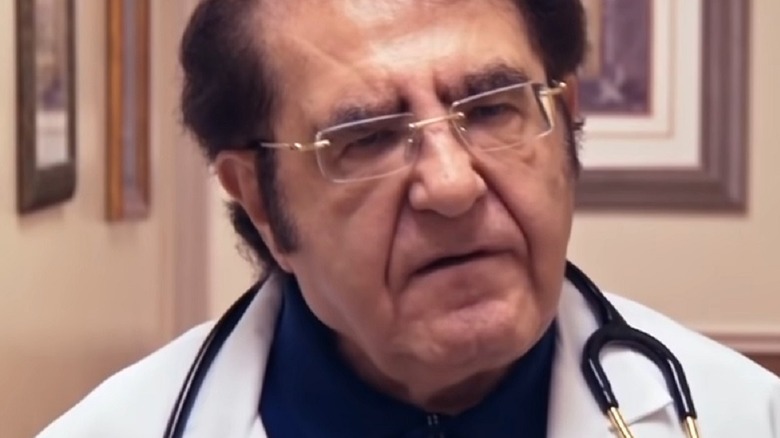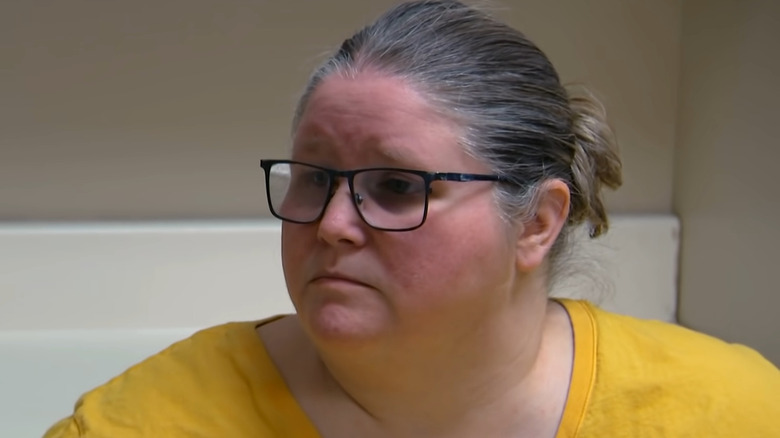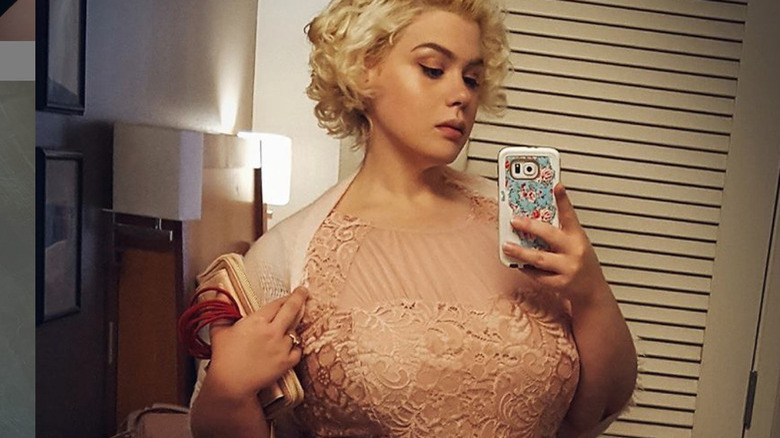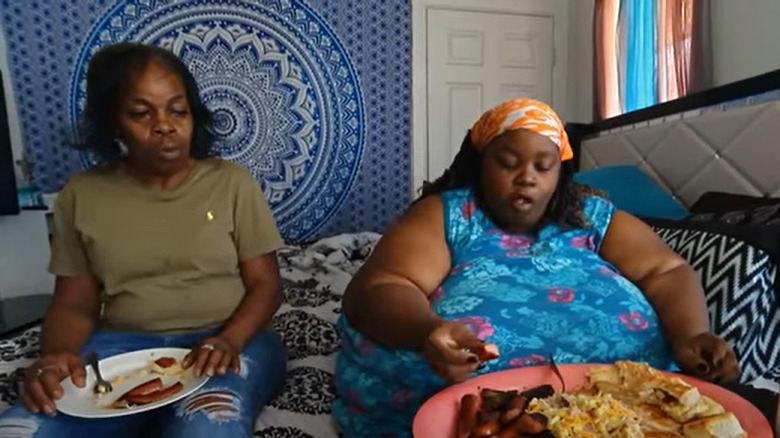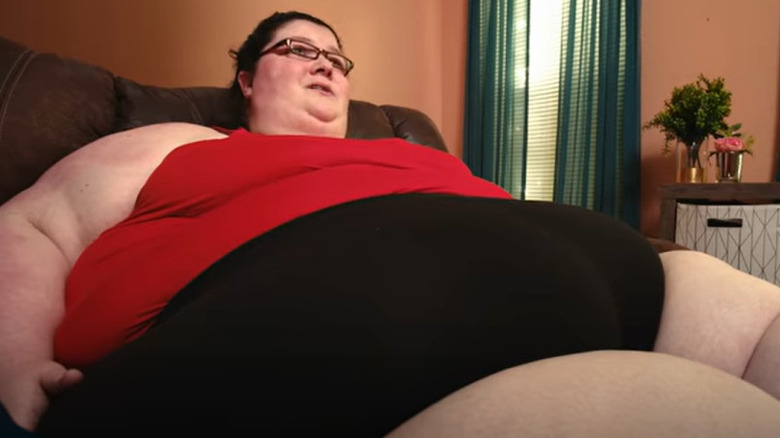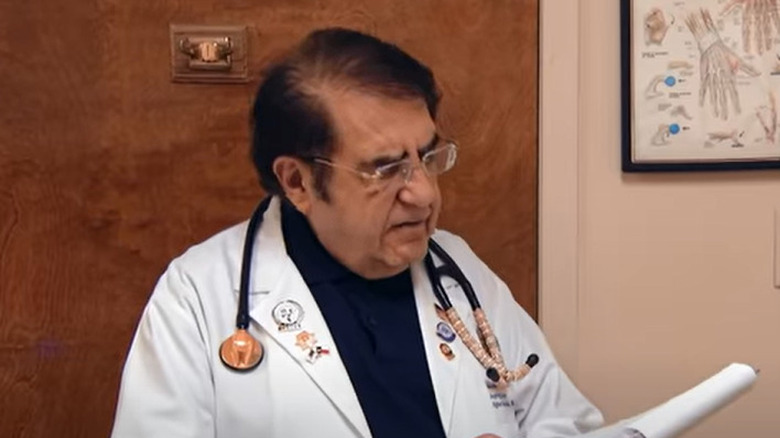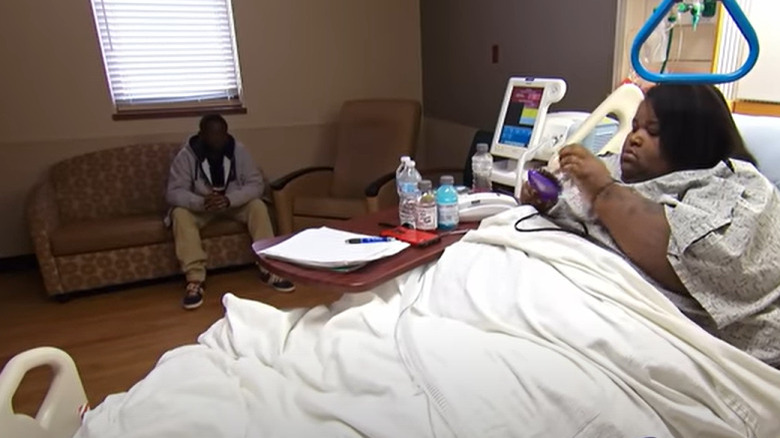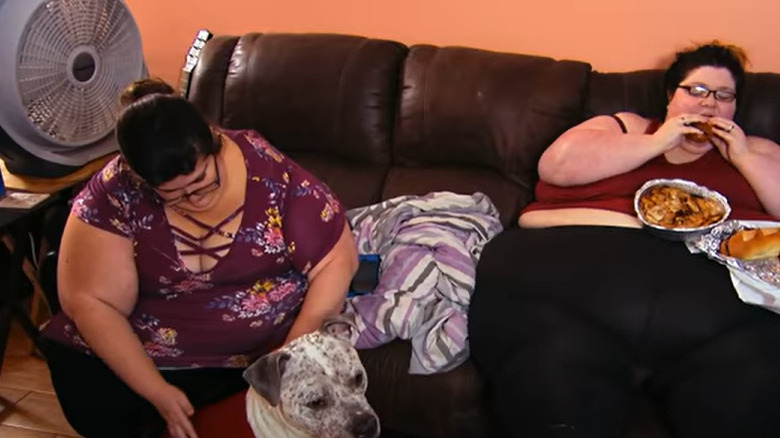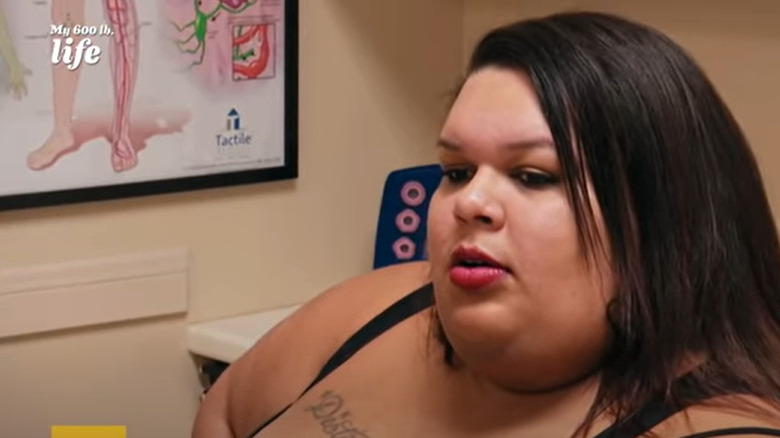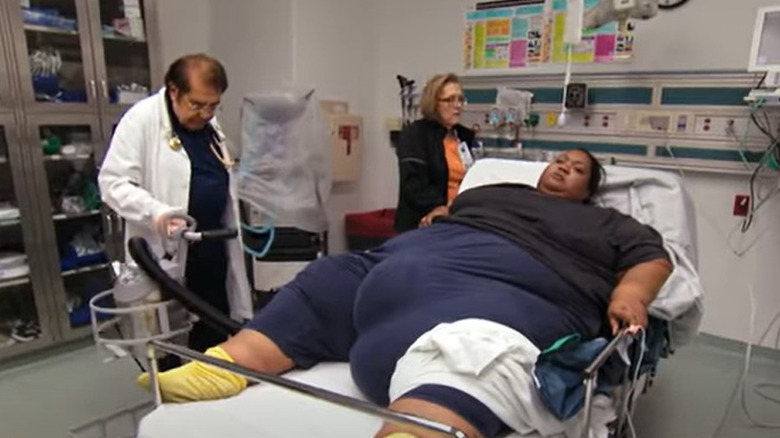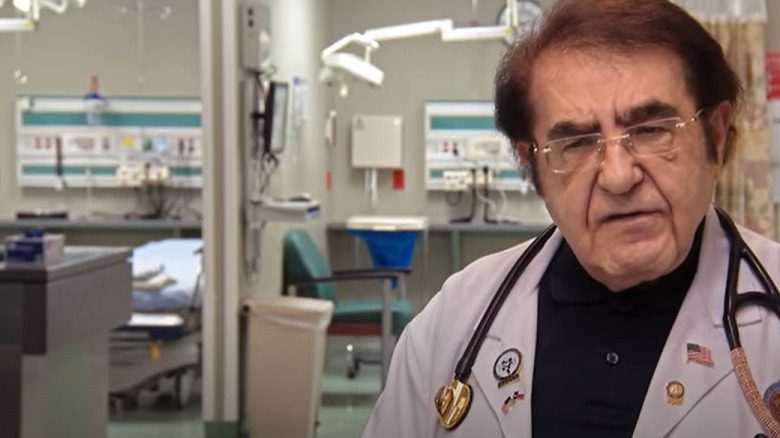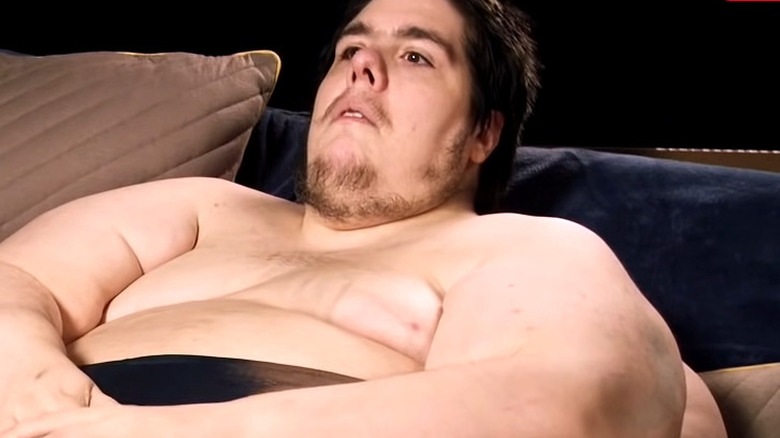Tragic Details About My 600-Lb Life
This article contains references to sexual assault and abuse
"My 600-lb Life" is a television show on TLC following the weight loss journey of morbidly obese patients as they try to turn their life around through gastric bypass surgery. While all of the patients are all clinically obese, the goal is to make permanent lifestyle changes over a year through the help of lead bariatric surgeon Dr. Younan Nowzaradan (or Dr. Now, as he's often called).
Since debuting in 2012, the show has witnessed tremendous success. Having been on the air for almost over a decade, the program has brought forth countless patients with amazing before and after photos and transformation testimonies for the world to see. Additionally, Dr. Now's no-nonsense approach has also been a crowd favorite and regarded as effective as he tries to implement new dietary habits while breaking the mentality of old ones.
There is, however, another side — a side with unflattering accusations and underreported post-surgery developments. But in reality, if everyone knew the hardships and off-camera antics that took place on "My 600-lb Life," the integrity of the show would be compromised. Even though patients are ultimately being given an opportunity to save their lives, unfortunate encounters have happened along the way for some, so here are the tragic details of "My 600-lb Life."
If you are struggling with an eating disorder, or know someone who is, help is available. Visit the National Eating Disorders Association website or contact NEDA's Live Helpline at 1-800-931-2237. You can also receive 24/7 Crisis Support via text (send NEDA to 741-741).
Patients can still gain weight after bariatric surgery
"My 600-lb Life" receives a lot of praise for helping patients turn their lives around. In the process, however, it depicts an inaccurate portrayal of bariatric surgery. "What you see on these extreme shows are only one small component of what it is actually like for patients," Colleen Tewksbury, Ph.D., MPH, RD, explained in her published research on bariatric surgery and nutrition care processes. For example, one of the many aspects of the surgery viewers may miss or not know from "My 600-lb Life" is that patients can still gain the weight back after surgery.
According to Mayo Clinic, for the most sustainable results post-surgery, patients must completely change their lifestyle, from what they eat to how active they are. Tewksbury echoed these sentiments in her study, writing, "The surgery is not a cure. Weight management care is long-term and requires life-long follow-up." Per Penn Medicine News, in their program, patients are typically closely monitored for about 90 days post-surgery, but care doesn't stop there. They're also provided with a support network and resources that they can easily access. Unfortunately, many patients on "My 600-lb Life" gained the weight back or succumbed to their addictions after their time on the show.
Complications after surgery
It'd be easy for someone to see bariatric surgery as a magic cure that will change their lives overnight after watching "My 600-lb Life" because more good stories make the headlines than the bad ones. But in reality, the surgery is not a catch-all: Even with post-surgery supervision, complications may still occur. Amber Rachdi, who lost up to 400 lbs. after her surgery, detailed her experience with some fans in an extensive Q&A on her Facebook page. When asked how long it took for her body to start operating like it once did, she replied: "Hair started coming back in after about 10 months, stopped falling out after 8. I had hecka bad acne for about a year. Menses came back at about 480lbs, then vanished again at 250, probably because of the hormone dose of my IUD being sufficient to stop it. It just takes time. Hang in there!"
Another former participant who had serious complications was Coliesa McMillian, who died from the issues she faced after her surgery. Although she lost 150 lbs. from her starting weight on the show of 643 lbs., she'd had a prior heart attack. Post-surgery, McMillian hemorrhaged, was septic, and ended up in a medically-induced coma before recovering. Several months later, however, she died.
Food restrictions post-surgery
Not only is there a possibility of complications post-bariatric surgery, but patients must undergo strict dietary restrictions for five to six weeks afterward to ensure the best results. Prescribed by Dr. Now, some extremes include not even being able to consume certain vegetables. But a diet with such extreme restrictions can't help but come with some side effects. Post-surgery patients also have to eat small amounts of food at a time and do it slowly. Not adhering to these guidelines can result in vomiting and in some cases, eating disorders.
While a liquid diet is a go-to, some people don't recognize the high amount of calories in some non-solids, such as milkshakes and sweetened juices. "Dumping syndrome" can occur if a patient eats too many sugary foods, leading to uncomfortable symptoms like cramping and diarrhea. Another possibility is developing sensitivities to foods that they used to be able to eat. In some cases, gluten or lactose intolerance is a result.
Some participants died
Unfortunately, death is a tragedy that's taken place on "My 600-lb Life," as at least 10 participants have died since its premiere. Take Season 1's Henry Foots. He did everything he was supposed to do, going from 715 to 275 lbs. But just when things were going well, Foots experienced personal troubles, including his father's death. He also caused the death of a woman when the bus he was driving crashed into another vehicle and he ran into the pedestrian waiting on a corner. Foots apparently had a "medical episode" prior to the crash. He died about a year later. The cause of death is unknown.
Gina Krasley also died at age 30, just weeks after announcing she was immobile due to an illness. Then there's Season 6's James Bonner, who committed suicide in 2018. Per the New York Post, his family filed the first lawsuit against the show. Season 5's James King is another patient who tragically died at age 49. Along with his wife, he was survived by two sons and four daughters.
If you or anyone you know is having suicidal thoughts, please call the National Suicide Prevention Lifeline by dialing 988 or by calling 1-800-273-TALK (8255).
The dismally low pay for patients
Being that "My 600-lb Life" has been on the air for as long as it has, one would assume the patients receive handsome checks for their participation. Yet, even while all medical expenses from the gastric bypass surgery are taken care of, according to Starcasm, the participants are only paid an appearance fee of $1,500 for the entire year of being on the show. Additionally, they're only given a $2,500 stipend to move to Houston, the report says.
For context, the average rent for an apartment in Houston is $1,263 and gastric bypass surgery averages around $23,000. Most importantly, however, Dr. Now is reportedly rolling in dough. According to Wealthy Persons, he is worth $6 million. However, per Houstonia, Dr. Now isn't getting rich off these surgeries. He told the outlet, "Looking at the moral obligation that we've got, you see somebody who has no life who could have a life. We don't need to be rich. We do make a living, but we don't need to worry about making a living out of every patient we see."
Participants often have traumatic histories
No secret, of course, but on the show, participants frequently detail being victims of abuse. Season 6's Schenee Murry, for example, entered "My 600-lb Life" at nearly 700 lbs. What viewers learned, however, was that Murry gained all of her weight by finding comfort in food after being molested as a child. "Inside, I felt terrible, but I just hid all my feelings in. I started sneaking food right after that incident. Food made me feel better ... so then I started putting on weight," she said in her episode.
Similarly, Season 7's Mercedes Cephas also had a tragic past. She revealed how her downward spiral into destructive eating occurred after she'd been sexually abused by a family member from a young age. In addition to the rest of her siblings suffering the same fate, Mercedes had to deal with the extra pressure of taking care of her mom when she got older.
Then there's Doug Armstrong, who turned to food for comfort after being abandoned by his mother. "My dad did the best he could — he was in the military, though, so he was away a lot of the time," Doug said on the show. "And when I was 8, a nanny's son who was older decided to have an inappropriate relationship with me ... So I dealt with the trauma of being abused by eating, and I started to gain weight."
If you or anyone you know has been a victim of sexual assault, help is available. Visit the Rape, Abuse & Incest National Network website or contact RAINN's National Helpline at 1-800-656-HOPE (4673).
Allegations of on-set mistreatment
While "My 600-lb Life" is a true medical journey with actual surgeries being performed, it's still a television show that answers to ratings. Nothing showed that more than in 2020 when Season 8's Gina Marie Krasley filed suit against Megalomedia alleging "intentional infliction of emotional distress and negligence," after producers allegedly forced her to consume "excessive amounts of food" to further her out-of-control eating narrative and to depict her as someone who "could not follow the diet." Per Starcasm, Krasley claimed that the show did not provide mental health resources or give her a psychological evaluation upon arrival.
Krasley wasn't the only cast member who took issue with how Dr. Now and Megalomedia ran operations. Nine other suits were filed, which a court consolidated as one. Among those were Season 6's Alicia Kirgan. Per her suit: "Plaintiff was provided a five-question mental health survey a couple of hours before her procedure that asked questions with true or false answers. If she answered one of the questions 'incorrectly,' the producers would take the form away and give her another until she answered all of the questions 'correctly.'" Maja Radanovic was another one to sue, accusing the company of "pushing unbeknownst participants to the edge of an emotional cliff."
Megalomedia's first attempt to dismiss the case was initially thwarted by a judge in 2020, but they won the dismissal after filing a notice of appeal in 2022, resulting in a loss for the patients.
If you or someone you know needs help with mental health, please contact the Crisis Text Line by texting HOME to 741741, call the National Alliance on Mental Illness helpline at 1-800-950-NAMI (6264), or visit the National Institute of Mental Health website.
Alleged transphobia
Forcing patients to eat excessively while on camera is not the only accusation of bad ethics the "My 600-lb Life" production team has faced. Season 7's Destinee Lashaee — the first trans woman to appear on the show – filed a suit against the show, alleging she was promised mental health treatment but was only provided one therapy session to address her grief and gender dysphoria. According to court papers obtained by The Sun, Lashaee levied serious accusations against the show, including fraud and emotional distress.
"The filming of her shaving was so painful that it was not made part of the show. The stress led Plaintiff to have a breakdown in which she kicked the producers out of her home, and threatened to kill them and herself," court papers read, as just one example.
Lashaee died in February of 2022, although her cause of death was not revealed. "No no no I'm sorry bro, I accept you for who you are, I accept every flaw that come with you, I'm sorry you felt alone, I'm sorry you felt you had nobody else to turn too," her brother, Wayne Compton, wrote on Facebook (via Deadline).
Did the show follow COVID-19 safety protocols?
Patients on the show weren't the only ones at odds with the show's production. The staff of "My 600-lb Life" also had issues with how things were run, specifically during the pandemic. According to The Hollywood Reporter, the show kept filming during the beginning of the pandemic despite protests from cast and crew members.
Text of internal company group chats obtained by THR revealed that, at one point, the camera crew tried entering a hospital on lockdown to film and that at least one crew member was told to not talk about COVID-19 while filming. "These castmembers have a compromised immune system already. They're not OK. They're not feeling comfortable," one source said to the publication. "It's super dangerous and none of us wants to be the person who gives it to the castmember."
While the studio eventually shut down after details became public in late March 2020, the risk they were putting both the cast and patients in is alarming, especially given the Centers for Disease Control and Prevention place obese individuals among those in a high-risk category for the virus.
Some feel that Dr. Now is mean
Anyone who watches "My 600-lb Life" can see that Dr. Younan Nowzaradan is a no-nonsense kind of guy. The Iranian-born doctor's signature stern talking style is only second to his emotionless, deadpan delivery when informing patients about the severity of their conditions or instructing them on how to diet. And his Simon Cowell-esque disposition is not just for the cameras. "I never let the camera change my behavior toward any patient," he told Houstonia. "I do exactly the same thing if the camera is there or not."
In one instance, Dr. Now candidly dismisses a patient's claim of having to eat something, by saying, "No, you don't have to eat something, you have eaten 800 lbs. of food in you." Michelle Marescott is another example. After failing to lose the mandated 60 lbs. to qualify for surgery, he dismisses her efforts, telling her, "If you did the diet you would have easily lost close to 100 lbs."
But is he actually "mean" or is his approach just in contrast to the frequent enabling that results in some patients becoming obese? "People come looking for a single solution to their problem, and sometimes the answer is not what they want to hear. They think surgery is the solution for everything," he says as what can be deemed a hard truth.
Participants endure harassment
While "My 600-lb Life" has a devoted fan base, the notoriety it's gained over the years has unfortunately made some patients targets for online harassment. One participant, Steven Assanti, faced problems after he left the show, got married, and became a stepfather. "It's been nothing but harassment towards, me, my wife, and my family, and it sickens me to the core," Steven said to Starcasm. "All I ask is for people to get a life and move on because not everything you see on television is accurate but small-minded folks will continue to believe that it is."
Similarly, Kathryn Lemansk, the fiancée of cast member Robert Buchel, was sent offensive images after he died. "I've gotten more [penis] pics in my Facebook than the porn industry, I'm not kidding," she admitted to App. "People have put my profile into multi-racial dating groups, homosexual dating groups, S&M dating groups. I mean, I got people including me in groups I didn't know even existed but somebody did it and I have to deal with that."
This is the unfortunate reality of people who appear on television, even if they were only seeking help and not necessarily fame and fortune.
If you are struggling with an eating disorder, or know someone who is, help is available. Visit the National Eating Disorders Association website or contact NEDA's Live Helpline at 1-800-931-2237. You can also receive 24/7 Crisis Support via text (send NEDA to 741-741).

